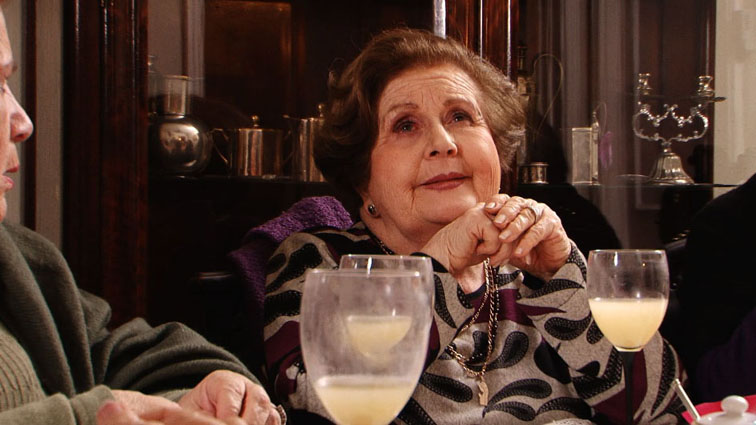- Film présenté cette année à Cinélatino
“El salvavidas” – Competencia Largometraje Documental
Premios en otros festivales: Premio del público Festival Internacional de cine de Valdivia.
- Direction
- Maite Alberdi
- Country
- Chile
- Format
- Feature film
- Type
- Documentary
- Original title
- La Once / Tea Time
- Planned casting
- Real characters
- Scenario
- Maite Alberdi
Maite Alberdi
Maite Alberdi has developed a very particular style that achieves an intimate portrayal of the characters she works with, through everyday stories in small-scale worlds. Films: The Lifeguard (2011), Tea Time (2014) I´m not from here (2016), The Grown-Ups (2017)
Filmography
LOS NIÑOS, long-métrage documentaire, 2016. Premier prix Compétition Officielle IDFA 2016, prix EDA du Meilleur documentaire réalisé par une femme, Compétition documentaire Toulouse 2017, Compétition documentaire de Guadalajara 2017, Vrai-Faux États-Unis 2017 LA ONCE, long-métrage documentaire, 2014 . Premier prix Compétition Première apparition IDFA 2014: Prix EDA du meilleur documentaire réalisé par une femme, Meilleur documentaire, Festival de Miami 2015, Meilleur documentaire, Docs de Barcelone 2015, Meilleur documentaire festival de Cartagena EL SALVAVIDAS, long-métrage documentaire, 2011. Compétition Officielle l’IDFA 2011, Prix spécial du jury, festival de Guadalajara 2012, meilleur documentaire des nouveaux talents du Docs de Barcelone 2012, Compétition internationale du festival de Valdivia 2011 YO NO SOY DE AQUÍ, court-métrage documentaire, 2016. Meilleur courtmétrage, Visions sudest 2016, Meilleur court-métrage, Cameraimage 2016, Prix du public, Documenta Madrid 2016, nominé pour le prix du film Européen : meilleur court-métrage
Note of intent
In Chile, we call the act of sitting to eat and drink tea at mid-afternoon “having eleven” (“tomar Once”). One of the myths about the origin of this expression is from toward the end of the XIX century, and tells of an 11-member women club that gathered for conversation, every afternoon, around teacups and pastries. Tea Time, the documentary, is like this story, and it captures a transversal social custom that happens at all ages and social extracts; it is, however, a rite that is dying. It used to be a moment of the day in which family and friends gathered to share; these women continue to do so daily, and as a group once a month, for sixty years. Although they had to live through various historical and political changes. Despite great differences in the way they face these changes, it seems important to us to show how they have been able to argue and still love each other. Friendship has made them transcend divergences, due to the constant gathering around the table. Through this group of women, liberal and conservative, the different thought processes that can exist in any given society are represented, in some cases they don’t agree or reach consensus but they do establish dialog and respect.
As the granddaughter of one of the characters, I have been observing this monthly rite since childhood. I want to tell this story because I think in this microworld are represented social and political differences that have lived in Chile. These people lived a time in which the role of women changed completely. They have constantly adapted to changes and today still do not give up, finding new opportunities which are inevitably the latest, and representing a new model of aging, which in spite of illness and approaching death, they try to be fully active.
Synopsis
Six elderly women religiously gather for tea, once a month, for the past sixty years. In these meetings, they try to look their best, jovial, as if they had their whole lives ahead of them, trying to momentarily hide the fact that time is inevitably passing for them.
Around the table, they make an effort to have something to tell, not to go unnoticed, showing they are still up-to-date. They spend their time interpreting current affairs and fashion from what others, or the TV, have told them. Despite not understanding some trends, they comment on them with absolute authority, trying to explain them to one another. In these teatime gatherings they learn, for instance, who is Madonna, what are swingers, and what “cool,” “humping,” and “making out,” mean.
When there are discrepancies, it is the personal histories that come out and highlight the differences of opinion. Despite having a common education in a religious school, they had to live through a period of radical historical changes that provoked polarizations within the group: some had access to higher education, others opted for being homemakers; some used contraceptives, others became widows before having access to them; some separated due to their husbands’ infidelities, others decided to keep appearances; some married officers in the armed forces, others had to suffer the disappearance of relatives during the dictatorship. Therefore, despite having very different biographies and personalities, which generates constant quarrels among them, in the long run they manage to understand, complement and accompany each other.
They have suffered mild losses in sense perceptions, but each one has a different ailment, so that an individual lack is supplemented by the group-mates. For example, the one that is not listening reads to the one that does not see. Thus, they manage to put together a lifestyle system that completely ignores the illnesses they suffer. The afternoons pass and it seems that nothing in their lives changes, until the death of one of them makes them go through a period of evident transformation.
Visual concept
“Tea Time” is an observation documentary where the audience will witness moments in dialogues and situations that are usually kept private. In the observation, the camera will be a silent witness that appears to be in that space by accident. The treatment will create the sensation that we are accompanying the characters during one afternoon, but little by little, we realize that time has moved forward, and that months and even years have gone by. The temporal treatment will represent the inevitable passage of time for these women; although it seems everything remains the same, the changes will become evident. The film is a tracking through time, which will center exclusively on this monthly encounter, when they get together for tea, and on a single setting: the table. The film is entirely set in this space. At the beginning, the story will seem anchored on a single teatime gathering, we will believe there is a temporal unity, but slowly, we will realize that covers an extended period of time in one place.

- Objectives sought in Films in Development
The goal is to find coproducers, or International presales or to present the proyect to future interest.
- Shooting planned date
The shooting began at 2010, and it will finish in december 2012.
- Planned shooting location
Only one location, The dinning room of one of the characters.
- Budget
- 160.000 EUROS
- Project's development phase
Script finished, in shooting stage.
- Production
- Empresa Micromundo























